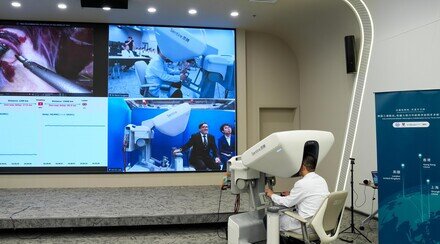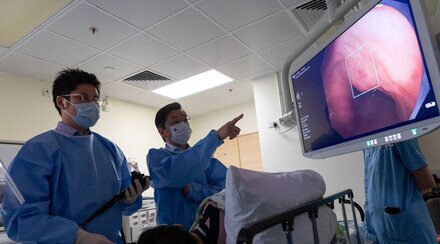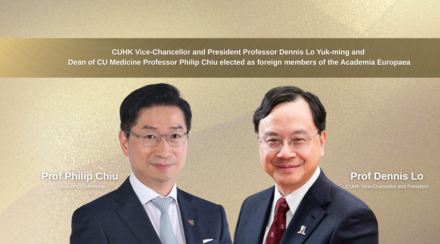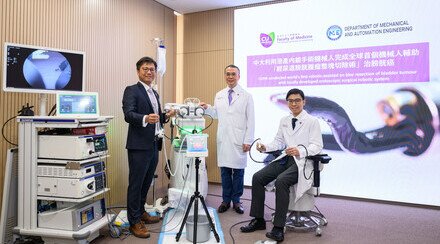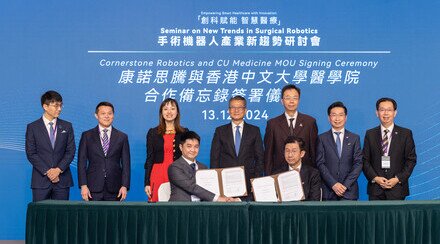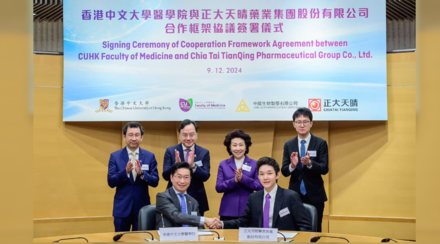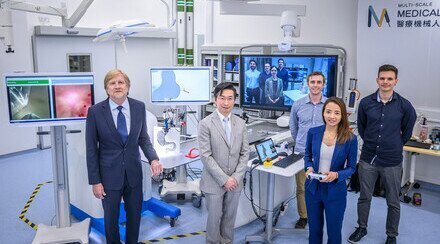Inaugural lecture of Shun Hing Education and Charity Fund Professorship in Robotic Surgery by Professor Philip Chiu: Dare to Dream – My Journey from Art, Medicine to Robotics and Translational Research
Professor Philip Chiu Wai-yan, Dean of The Chinese University of Hong Kong (CUHK)’s Faculty of Medicine (CU Medicine), has been named Shun Hing Education and Charity Fund Professor of Robotic Surgery for his pioneering spirit and dedication in promoting novel endoscopic technologies and robotics for the management of early upper gastrointestinal (GI) cancers through translational research, in Hong Kong and beyond. In the role’s inaugural lecture, Professor Chiu, a world-renowned surgeon in upper GI surgery and novel endoscopic and robotic surgery, shared his life journey, from the training and inspiration he received from Chinese art to his mastery of surgery, robotics and translational research.

Together with Professor Rocky Tuan, Vice-Chancellor and President of CUHK; and Professor Alan Chan, Provost of CUHK, Professor Chiu gives a Chinese painting by himself to Dr David Mong, Chairman of the Shun Hing Education and Charity Fund, as a token of appreciation to Shun Hing Education and Charity Fund’s support.

Professor Philip Chiu says it is of his greatest honour to be endowed as Shun Hing Education and Charity Fund Professor of Robotic Surgery. At the inaugural lecture, he shares his life journey, from the training and inspiration received from Chinese art to his mastery of surgery, robotics and translational research, and expresses gratitude to his mentors, including Professor Arthur Li, Professor Sydney Chung, Professor Joseph Sung and Professor James Lau.
Leading upper GI surgery from minimally invasive to non-invasive
Upper GI surgery is considered one of the most challenging surgical specialties, as patients with oesophageal and gastric cancers usually present at a late stage, and have grave prognoses. Oesophagectomy is a conventional treatment for patients with oesophageal cancer, but it is a challenging surgical procedure involving removal of all or parts of the oesophagus.

A research team member explains to secondary school students about the endoscopic surgical robot system EndoR developed by the CUHK, which was designed to improve the safety and effectiveness of endoscopic submucosal dissection (ESD) surgery. The innovation has won the Gold Medal with Congratulations of the Jury at the International Exhibition of Inventions Geneva and 2023 Red Dot Award.
Recognising that the prognosis of patient with upper GI cancer depends not on the perfection of surgery or oncological therapy but on the stage of diagnosis, Professor Chiu went to study in Japan in 2003 under Professor Haruhiro Inoue, to learn the endoscopic diagnosis and treatment of early upper GI cancers, a novel, minimally invasive approach. The next year, he became the first in Hong Kong to perform endoscopic submucosal dissection (ESD) to treat early GI cancers. This groundbreaking procedure preserved the patient’s organ, which would have otherwise required conventional removal surgery.
While ESD offers numerous advantages compared to traditional surgery, it presents technical challenges in terms of learning and execution. To overcome these limitations, Professor Chiu took the lead in collaborating with engineers from Singapore to develop robotic endoscopic platforms. In 2009, he pioneered the performance of robotic minimally invasive oesophagectomy at the Prince of Wales Hospital. Subsequently, in 2011, in collaboration with Nanyang Technological University and the National University of Singapore, he translated flexible robotics into clinical applications by performing the world’s first flexible robotic gastric ESD, followed by the world’s first robotic colorectal ESD in 2020.

Guests learning about the endoscopic robotic surgical system which is solely created by CUHK. The system is a joint work of the research teams led by Professor Chiu and Professor Samuel Au, Professor of the Department of Mechanical and Automation Engineering, and is in the stage of clinical trial.
To further increase the clinical applications and accessibility of robotic surgery, Professor Chiu led the establishment of the Multi-Scale Medical Robotics Center (MRC), in collaboration with research teams from top-notch institutions, including Imperial College London, ETH Zurich and Johns Hopkins University, to nurture collaboration among clinicians, engineers and researchers. MRC is part of InnoHK’s artificial intelligence and robotics (AIR@InnoHK) research cluster, and works to translate the novel robotic surgical system developed in Hong Kong for clinical application.

This photo features the latest medical inventions of flexible robots, including nanorobotics and a magnetic-guided system, created by the team of Professor Zhang Li, Professor in the Department of Mechanical and Automation Engineering, CUHK. CU Medicine is closely working with Professor Zhang’s team to translate their research into clinical applications.
Professor Philip Chiu Wai-yan, Shun Hing Education and Charity Fund Professor of Robotic Surgery and Dean of CU Medicine, mapped out the future directions of robotic surgery development. He said, “Robotic surgery should extend beyond the current horizon of minimally invasive surgery and overcome technological challenges to achieve non-invasive surgery. We are currently working with engineers at CUHK to pioneer the next phase of development in flexible robotics, including nanorobotics. Besides, we strive to enhance the performance of robotic surgery beyond our senses. With the current robotic surgical system, the laparoscope serves as our eyes and the robotic arm as an extension of our hands, while surgeons still serve as the brain, orchestrating the surgical procedure. We believe that in the future, artificial intelligence will serve as our co-pilot in mastering complex robotic surgical procedures.”
Fulfilling his childhood dream with boldness and dedication
Professor Philip Chiu’s upbringing fostered his interest in both medicine and Lingnan art from a young age. With a passion to help as many people as possible, he chose to become a doctor. He obtained his Bachelor of Medicine and Bachelor of Surgery degree in 1994 and his Doctor of Medicine degree in 2009, both from CUHK. The practice of Chinese art empowers him to excel in the field of surgery. He has said that the precise hand-eye coordination and meticulous planning required in painting are similar to those required when performing surgery.
Inspired by one of his favourite science fiction series, Star Trek, Professor Chiu’s childhood dream was to “boldly go where no one has gone before”. It has since become more than a dream for him, as he has achieved many firsts in the exploration of diagnostic and treatment options for early GI patients over the years. His work has also been recognised with numerous prestigious awards, which include the State Scientific Technology and Progress Award from the People’s Republic of China in 2007 and a 2nd class award in Technological Advancement from the Ministry of Education of the People’s Republic of China in 2011. His research on Per-oral Endoscopic Myotomy (POEM) was awarded the best of Digestive Disease Week 2011 and given the first prize in the American Society for Gastrointestinal Endoscopy (ASGE) World Cup of Endoscopy 2012. He was awarded the Asia Pacific Digestive Week JGHF Emerging Leader Lectureship in 2016 and named as a Global Outstanding Chinese Youth 2016. He received two Gold Medals with Congratulations of the Jury at the International Exhibitions of Inventions of Geneva (2019 and 2023) and the Spirit of Hong Kong Award in Innovation in 2020. In 2023, he was bestowed Honorary Membership of the European Association of Endoscopic Surgery and the Karl-Storz-Harold Hopkins Golden Telescope Award at the Hamlyn Symposium on Medical Robotics by Imperial College London.
About the Shun Hing Education and Charity Fund Professorship in Robotic Surgery
Shun Hing Education and Charity Fund established the Shun Hing Education and Charity Fund Professorship in Robotic Surgery in 2024. The Endowed Professorship in Robotic Surgery is part of the CUHK ’s 60th Anniversary Named Professorship Scheme, which is among the highest honours that the university bestows upon academic colleagues. The professorship was established to support continued research in innovative robotic surgery, laying the foundation for more transformative medical diagnosis and treatment solutions that can ultimately improve lives.
CUHK has received substantial support from the Fund for projects across diverse domains over the years. In 2022, the Fund made a significant donation to CUHK to purchase a new robotic surgical system, which aims to overcome the limitations of current systems and reduce patient waiting times.

Professor Chiu presents the CU Medicine bear statue as a souvenir to representatives of the Shun Hing Education and Charity Fund.






